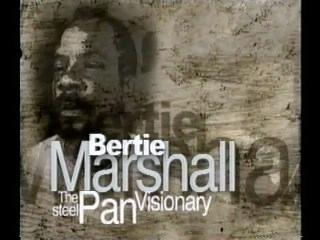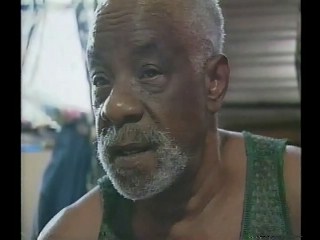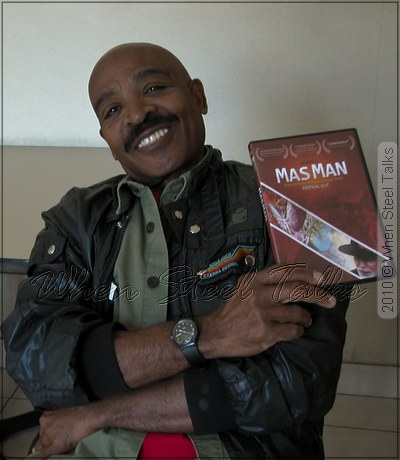
For three decades, when pan should have marched in lockstep with his ambitious projects, Marshall has been in limbo, having no choice but to succumb to the whims of a nation that has fed him awards and pappyshow. Awards that carry no legal tender. Pappyshow that bring along grief because there’s no conversion rate. To the powers of the country, the great Bertie Marshall is not bankable. Has never been.
Such mamaguy can be hard on the heart, hard to take for a 74-year-old who has captivated the culture with his realization of surrealistic dreams - through his association with top-flight steel bands in Highlanders and Desperadoes.
Bertie Marshall - The Steel Pan Visionary
In 2003, when the Trinidad Carnival honored Marshall for his enduring and endearing contribution to Pan - its seismic advancement ensuring a lifetime ripple effect on the instrument worldwide - Patrick Arnold, then-president of Pan Trinbago, promised the tuner $50,000 at the Highlanders Reunion in Success Village, Laventille.

Acclaimed tuner, inventor Bertie Marshall
A surge of groans stirred the audience, which included Minister of Culture Penelope Beckles. Several Highlanders’ panists and villagers were openly dismissing the offer out of hand. Every invitee, for sure, must have known the score.
Of course, seven years later, as had happened with the multiple awards, only the ghost of actuality materialized for Marshall.
Until recently.
Marshall allows that he’s received a stipend from Pan Trinbago the past few months. “To help out.” A relief in every sense of the phrase.
Marshall lived around the corner from me, and next door to Les Slater, his trusted co-arranger during the resurrection of Kim Loy Wong’s Hilanders. And not only us (we’re literally brothers in pan and pan lore), but also panists who helped to shape Forsyth Highlanders, like Teddy Belgrave, Clyde “Lightning” George, Ken Fortune and Franklyn Ollivierra, as well as an entire community, including Terry Joseph and the award-winning columnist Keith Smith of the Trinidad Express - all of whom (those alive, of course) can attest to Marshall’s single-minded purpose to alter the face of pan. To revolutionize how the ear received its beauty.
Today, when you dial Marshall’s number, a recording lets you know, in no uncertain terms, that “This is Bertie Marshall, the inventor of the modern-day steel band.”
Here’s the message Marshall has left us:
-
Harmonic tuning (“All tuners became my friend.”).
-
Soprano pan or high tenor.
-
Double Tenor.
-
The Quadrophonic (co-invented with the late Desperadoes leader/tuner Rudolph Charles).
-
Electronically amplified pans. * The Bertfone, which sustained notes like an organ, complete with damper pedal.
-
Pan accompanying the choir in the Cathedral; operating independently as an orchestra, too.
-
Stylish jazz phrasing employed in calypso as well as classical renditions for the road.
-
Originated the use of canopies for pan racks, realizing before anyone else the damaging effect of heat on the instruments.
-
One of the premier party steel bands of its era.
And, advancing his legacy, the introduction of the G-pan, which continues to evolve at the University of the West Indies. Ironically, supported by an infusion of funds - financing that Marshall has never been privy to receive, much less apply for.
At a city apartment in a housing project on Observatory Street, in the back of the Renegades pan yard across from the Dry River, the sound of Marshall’s pocket money rings continually every day. Why does he still need to slave so, despite a stroke that laid him up several years ago?
“I still tuning,” Marshall says by phone. “I have to live!”
Hope! The currency of survival that lent Pan’s significant change to proper tone. Marshall’s tone.
By DALTON NARINE
The Bertie Marshall Film
by Dalton Narine
Bertie Marshall, 74, is a dreamer and trailblazer. A tuner of forceful personality who impressed his will on Pan.
A harmonica player, he strove to achieve harmonics on steel. Not a single note played on the instrument in the 1950s, even by the top steel bands, resonated in his ear.
Each note lacked something crucial to music. The blending of several notes or harmonics to beget the dominant note. That’s what Marshall accomplished through experimentation.

Film maker Dalton Narine
As in religion - well, as in pan - every scrap of information is subjected to subjective interpretation. Anthony Williams will forever be in conversation. In 1953, Williams of North Stars, also was tinkering with the sound. Using a peculiar grooved design he termed the spider web, Williams found that by hammering octaves on each corner of a note he had eliminated overtones. However, while tuning pans in New York City with a strobe in 1969 for a Madison Square Garden concert featuring Trinidad’s most famous pianist, Winifred Atwell (accompanied by North Stars), the gospel truth did not elude Williams. “It was the first time that I had [knowingly] tuned with harmonics,” he recalls.
By that time, Bertie Marshall’s Highlanders had won two Bomb competitions in Port of Spain. Led by a single electronically amplified tenor, the harmonically empowered steel band marked a milestone in Pan in 1965 when it performed Handel’s “Every Valley Shall be Exalted,” and, two years later, the most complex Bomb tune of all time, Rossini’s “Italiana in Algeri” (Italian Girl in Algiers). Even the basses and a couple of other pans were amplified for the 1967 road jam.
Since that glorious epoch of the 1960s, Highlanders - and, by extension Pan - sprung up like a grass fire. The Bertie Marshall film attempts to capture the flame of his genius, and explain Highlanders’ exalted place in the pantheon of Pan.
The film is a copy of a copy of an original work that went unfinished because the schedule was constrained by limitations. Four days of shooting and four nights of editing, which is unheard of in the industry. If we hadn’t done it then, and if Keith Smith hadn’t believed in the project, the documentary never might have seen light of day. Truth to tell, what got aired was a truncated version absent Highlanders’ rich score.
So, I’m unveiling on When Steel Talks, the full-length production (50 mins.) we intuitively recorded for posterity. The film, parts of which are flawed by the recopying process, hasn’t been made available to the public until now.
Dalton Narine - Producer, Writer, Director
Contact Dalton Narine - narain67@gmail.com
Leave a comment in the WST forum
Permission to screen Bertie Marshal film on When Steel Talks/PanOnTheNet
“I am granting permission to When Steel Talks (PanOnTheNet) to screen my 50-min. version of Bertie Marshall - Steelpan Visionary, which has never been aired in its entirety.
WST (When Steel Talks), I understand would put it on its website for viewing by a global public of pan enthusiasts.
I sanction this enterprise particularly if
WST rolls the film in its entirety and not divide it into
segments which would mar the narrative continuity of the film.”
- Dalton Narine - Producer, Writer,
Director
Leave a comment in the WST forum





